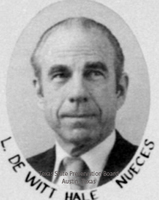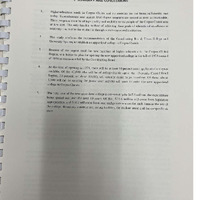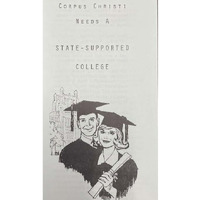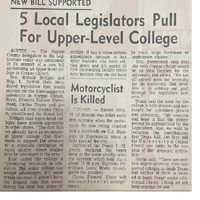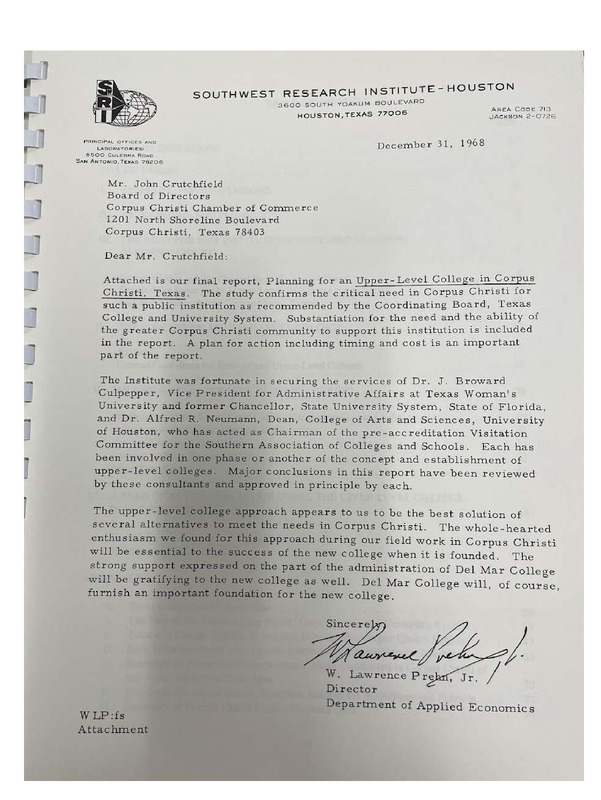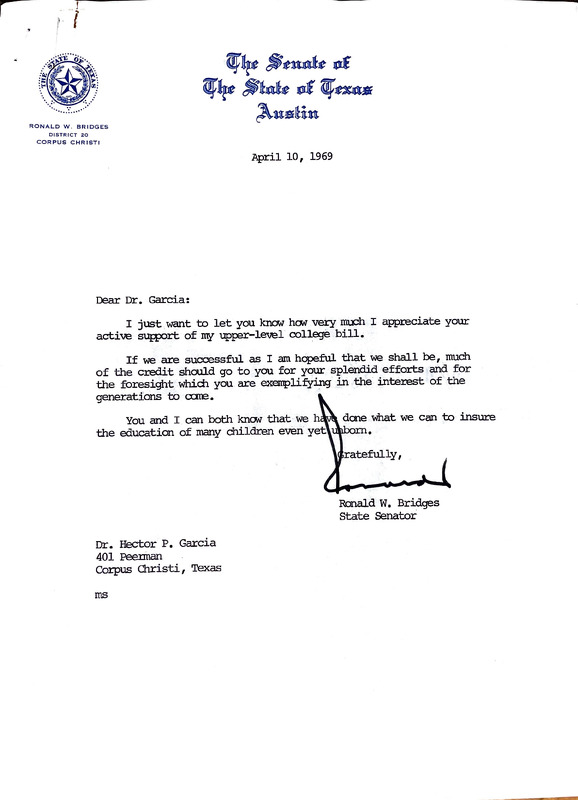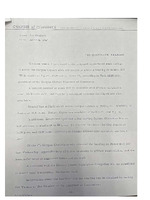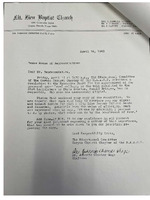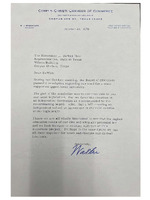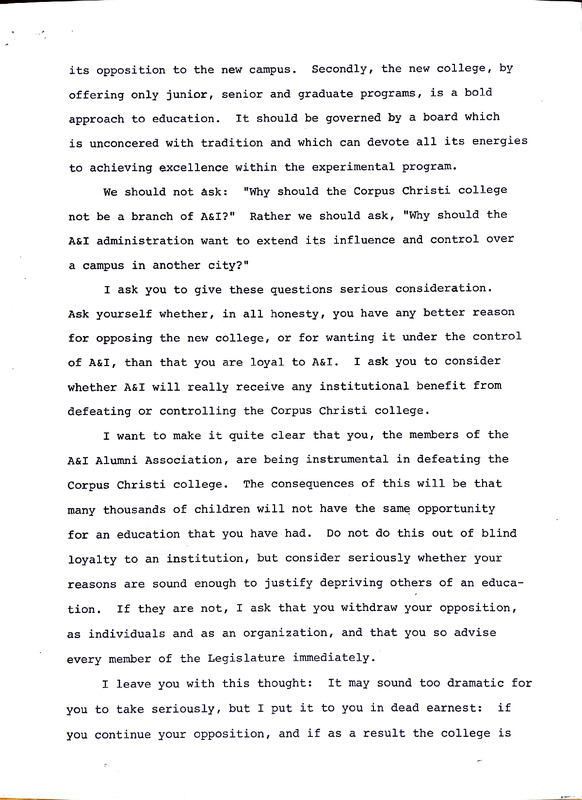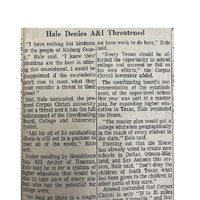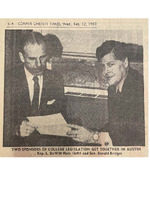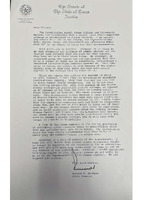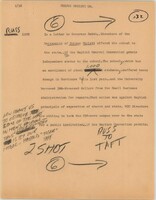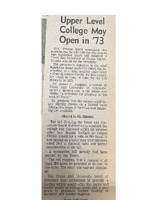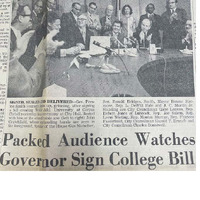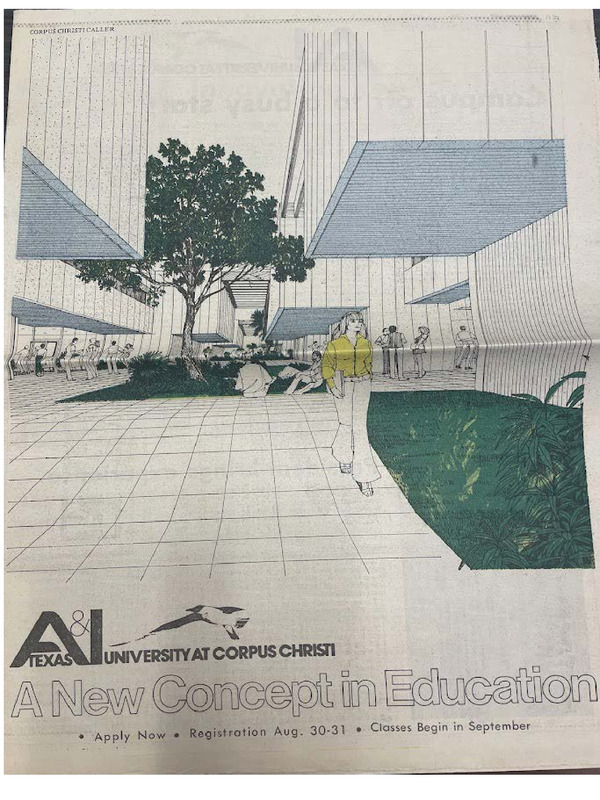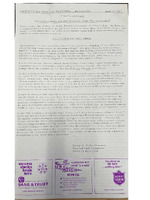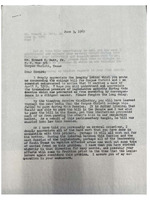‘In the Interest of Generations Yet to Come’: The Fight for a Public Institution in Corpus Christi
by Holly A. Schuh-Wolff
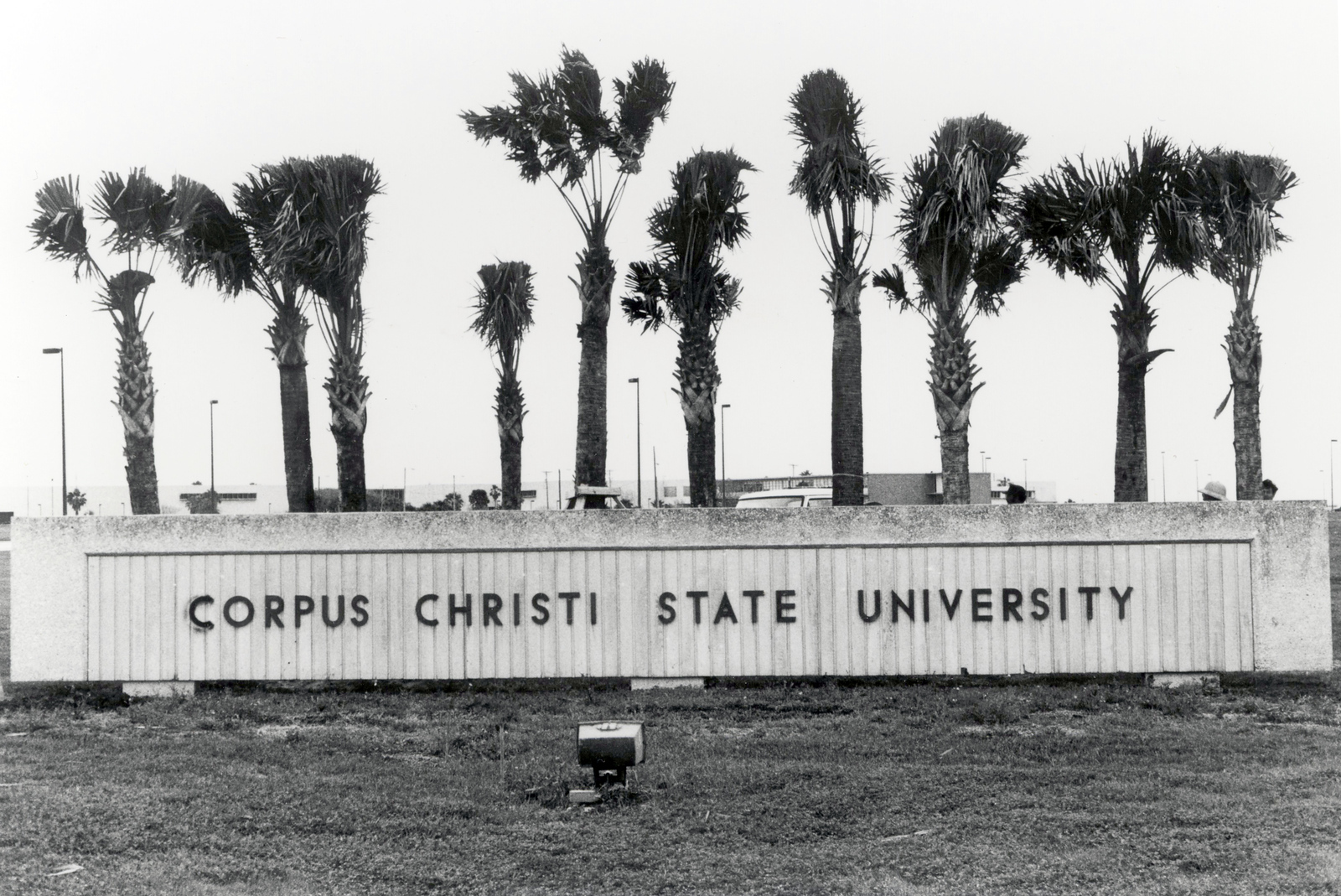
Introduction
Did you know that Corpus Christi would have a public college whether or not it sat uptop Ward Island? The broad history of Texas A&M University-Corpus Christi (TAMU-CC) as understood by public perception is presented as linear in nature: the University of Corpus Christi was a private religious college before being adopted by the State of Texas as a public university with a new name. However, this story is more complex. I argue we should be delving deeply to truly understand the passion it took to erect this univeristy, and how such passion could be mimicked today for similar results. There is much nuance that accompanies the story of our University, and by exploring this nuance we can find examples of political support and community togetherness that reveals the heart of our history.
In this digital exhibit, I examine the details of Corpus Christi’s acquisition of a public university from 1968 to the early 1970s, calling attention to the actions and voices of government and civic leaders that made this possible.
Background
The history of Texas A&M University-Corpus Christi often begins with the formation of the University of Corpus Christi, a Baptist college that sat atop Ward Island, a former military housing base. The University became a regional public senior college, Texas A&I at Corpus Christi, in 1973. It was not until later that decade that the University became Corpus Christi State University (CCSU), continuing as a senior-only college.
Among the many that conspired to get this project off the ground and into the community, there are some that have recorded such involvement in the archives. Senator Ronald Bridges was the District 20, Corpus Christi, Texas Senator re-elected from January of 1969 to 1973. L. DeWitt Hale was the Nueces and Kleberg County Representative in the Texas House re-elected from January of 1969 to 1973. Thanks to the meticulous recordkeeping of Hale and Dr. Hector P. Garcia, we are able to analyze this event with greater understanding. Together, these men, their active involvement, and the open arms of the Corpus Christi community pushed forward until reaching success.
Analysis: How did they make it happen?
Proving it was needed
In a report commissioned by the Corpus Christi Chamber of Commerce in 1968, the Southwest Research Institute-Houston found Corpus Christi was in significant need of a public higher education institution. Projecting this need as immediate and recommending a start date prior to 1974, the report states steps needed to mitigate the growing educational disparities in the Coastal Bend. As children of the Baby Boom and beneficiaries of the G.I. Bill began to trickle into higher education, the nation was predicting an uptick in college enrollment. Corpus Christi, being one of the top growing Texas cities and adjacent to a military base could foresee a large number of wanting college students in need of an institution. A Corpus Christi citizen’s closest option for senior-level public education was 30 to 45 minutes away. That institution, Texas A&I University in Kingsville, was successful for the needs of its community, but would not fit the mold required to service the Sparkling City. Citizens of Corpus Christi would need flexible class schedules, programs that adapted continuity to a Del Mar College degree, and somewhere close to their homes to attend. The constituents most likely to be served by opening such an institution would be working adults, those with families, nontraditional and first generation students. Simply bussing students to Kingsville each day would not be sufficient. Citizens needed more.
As stated in the report forward by Prehan, "The whole-hearted enthusiasm we found for this approach during our field work in Corpus Christi will be essential to the success of the new college when it is founded." The researchers saw the desire and genuine needs of the community. Now, the leaders of this cause needed to bring those voices to the forefront.
Getting the community behind the cause
Senator Bridges and Representative Hale were greatly aware of the community’s needs. While there was a college on Ward Island, this university was not public and therefore not an open, affordable option for the demographics of the city. Adamant to be granted higher educational opportunities in Corpus Christi, the two both submitted bills to their government branches. To aid their cause, Bridges drafted flyers urging community members to write to senate leaders as to persuade them to support the bill. If both of their bills passed, then were signed by Governor Preston Smith, this would approve the establishment of a public senior-level college in Corpus Christi. Though not as simple as calling a representative like we do in the modern day, gathering citizens to write letters to government colleagues was one way Bridges and Hale made the community’s voice heard, empowering them to be present in this fight.
Delving into the community, Representative DeWitt Hale had relationships with members of the Corpus Christi Chamber of Commerce and various community leaders. In letters he recieved from Chamber President W. J. Reasonover and the local N.A.A.C.P. chapter, both groups signify their support of the upper-level college and Hale's work to make it happen. He also corresponded with Howard E. Butt, Jr., a huge proponent and philanthropist for education. In their letters, Butt makes Hale aware of his continued support in the best interest of the students of the community. The community, seeing his verve, reflected their appreciation by often writing to him detailing their approval and encouraging him. They would even make note of their own networks that had been contacted in effort to gain supporters.
Senator Ronald Bridges also used his platform to reach out to notable leaders of the area. A letter to Dr. Hector P. Garcia from Senator Bridges in 1969 highlights this cooperation among key players. Dr. Garcia was an activist of the Coastal Bend, Texas, and the United States. He was also a major spokesperson for educational equality and access, founding the American GI Forum in the '50s. His influence throughout the community was significant for causes of all kinds. As stated by Bridges, "much of the credit should go to you for your splendid efforts and for the foresight which you are exemplifying in the interest of the generations to come." Support from Dr. Garcia would be considered greatly influential as he was a pillar of the community. Using resources such as these would have been strategic and important in rallying the city behind the cause.
Debating the opposition
As the bills and the efforts of the community made themselves known, they were not without reproach. Much pushback for the proposals were made from representatives of Texas A&I University in Kingsville and prominent Kingsville townsfolk. The university’s president Dr. Jim Jernigan, as well as the A&I alumni board, were very vocal in their distaste for Corpus Christi to gain its own institution. They considered it a threat to the success and credibility of their own college. Bridges, seeing this insistency to oppose a new university, composed a rebuttal to the opposition. The Senator wrote a persuasive response to all the critiques brought by the A&I Alumni Association, as well as President Jernigan. Most memorably, he ends the Alumni Association document with this:
“I leave you with this thought: It may sound too dramatic for you to take seriously, but I put it to you in dead earnest: if you continue your opposition, and if as a result the college is defeated, as it almost certainly will be, it is on your conscience. We will have fought, and you will have won. But it will be a hollow victory.”
Representative Hale also went toe-to-toe with the objectors. Speaking up for his bill in the House of Representatives, he argued, "As long as there is a single child with an ambition to get an education and can't get it, then we have work to do here." Even being a representative of Kleberg County, he did not hesitate to call out the college and the city for depriving Corpus Christi of its own institution.
These legislators persevered through years-long work to make their bills become the upper-level institution Corpus Christi needed. This work would greatly pay off in the end. And to their benefit, there were other forces concurrently at play.
Gathering local resources
Around the same time that Bridges and Hale were working through the community and their colleagues, the University of Corpus Christi was struggling. They were in desperate need to repair the island campus after Hurricane Celia in 1969. Many buildings were damaged, including the library, the heart of the campus. Because it was a small, private institution, receiving public aid for rebuilding was not possible. Looking to accept funding from the government for repairs, UCC’s board requested to divest from the Baptist General Convention of Texas. Once UCC was relinquished from the BGCT, its board offered the property to the State. Though this signaled a possible end to the private college, it opened an aptly placed door for the cause of the upper-level college.
Celebrating the victories
Senator Bridges and Representative Hale finally reached success in their branches of government. The House passed Hale's bill, and the Senate quickly followed by passing Bridges's bill. The last element was the signature of Governor Preston Smith. The Governor traveled to Corpus Christi to sign this community dream into reality in 1971. After all was said and done, the signing would indicate this: Corpus Christi would have a state-supported upper-level university under the hand of Texas A&I University. This would be called Texas A&I University at Corpus Christi. This institution would fill the campus void of UCC beginning in 1973. After a few years under the guidance of A&I, the school would be allowed to change its name and governance.
In the end, Bridges and Hale had put pen to paper and advocated in accordance, and this work paid off. This was a huge victory for the community! Now they could work to make the future university a great asset to the city and their constituents.
Opening the doors
Finally, Corpus Christi would have its public unversity. UCC, still having students enrolled there, graduated its final class in the summer of 1973. That same fall, the new public senior college, Texas A&I University at Corpus Christi, welcomed its first class of students. This new institution was an upper-level college, providing the community with a locale for citizens to complete their Bachelor’s degrees. There were classes that accommodated working students, students with families, and traditional students matriculating from Del Mar College as well.
It was everything that the Chamber of Commerce had researched for, what Bridges and Hale had fought for, what the community had rallied for.
Conclusion and Modern Day Application
In the end, Corpus Christi received a public institution that has benefited the community and Coastal Bend region in myriad ways. However, the process and result may not have been as well-fought and appropriate if not for the advocates that stepped up as representatives of the community. Cleverly, Ronald Bridges and DeWitt Hale worked with citizens, city government, state government, and community activists and philanthropists to make this all possible.
In the current day, more of these voices and ‘perfect storms’ of cooperation are needed to enact change in higher education. By finding the common goal, this city gained a great asset. What else could be accomplished if we operated similarly? Bringing together the community, our representatives, and activists is a trifecta for a force not so easily pushed aside. A large motivating force today is funding and status. A gathering of this kind, with political minds, well-known faces, and backing dollars could accomplish similar feats.
Especially as times are changing and higher education continually goes under the magnifying glass, it will take a village to uplift and support these public institutions. Let the 'generations yet to come' be our motivation to continue on this hard-fought path, in the hopes we see change that reflects the dreams of our communities.
Resources
Bridges, R. (1969, April 10). [Letter to Dr. Hector P. Garcia]. Hector P. Garcia papers (Box 304, Folder 13). Special Collections and Archives, Mary and Jeff Bell Library, Texas A&M University-Corpus Christi.
Bridges, R. (n.d.). [Memorandum] Dear friend. Hector P. Garcia papers (Box 304, Folder 13). Special Collections and Archives, Mary and Jeff Bell Library, Texas A&M University-Corpus Christi.
Bridges, R. (n.d.). [Memorandum] Legislators need to hear from you about Senate Bill 175 by your Senator, Ronald Bridges. L. DeWitt Hale papers (Box 82, Folder 6). Special Collections and Archives, Mary and Jeff Bell Library, Texas A&M University-Corpus Christi.
Bridges, R. (n.d.). [Memorandum] To the members of the Texas A&I University Alumni Association. L. DeWitt Hale papers (Box 82, Folder 6). Special Collections and Archives, Mary and Jeff Bell Library, Texas A&M University-Corpus Christi.
Butt, H.E. (1969, April 2). [Letter to L. DeWitt Hale]. L. DeWitt Hale papers (Box 82, Folder 6). Special Collections and Archives, Mary and Jeff Bell Library, Texas A&M University-Corpus Christi.
Corpus Christi Caller. (1969, May 20.) Hale denies A&I threatened. L. DeWitt Hale papers (Box 13, Folder 6.13.5). Special Collections and Archives, Mary and Jeff Bell Library, Texas A&M University-Corpus Christi.
Corpus Christi Times. (1969, February 12). 5 Local legislators pull for upper-level college. L. DeWitt Hale papers (Box 13, Folder 6.13.5). Special Collections and Archives, Mary and Jeff Bell Library, Texas A&M University-Corpus Christi.
Coudert, J. (1969, April 18). [Press release from the Chamber of Commerce]. L. DeWitt Hale papers (Box 82, Folder 6). Special Collections and Archives, Mary and Jeff Bell Library, Texas A&M University-Corpus Christi.
Ford, G.K. (1969, April 23). [Daily Bulletin] Senior college for Corpus Christi. L. DeWitt Hale papers (Box 82, Folder 6). Special Collections and Archives, Mary and Jeff Bell Library, Texas A&M University-Corpus Christi.
Gage, J.C. (1969, April 14). [Letter to Mr. Representative from the N.A.A.C.P.]. L. DeWitt Hale papers (Box 82, Folder 6). Special Collections and Archives, Mary and Jeff Bell Library, Texas A&M University-Corpus Christi.
Hale, L.D. (1969, June 3). [Letter to Howard E. Butt, Jr.]. L. DeWitt Hale papers (Box 82, Folder 6). Special Collections and Archives, Mary and Jeff Bell Library, Texas A&M University-Corpus Christi.
Hale, L.D., Truhan, C., Farenthold, F., Salem, J., & Wieting, L. (1969, May 16). [Memorandum] To the members of the House. L. DeWitt Hale papers (Box 82, Folder 6). Special Collections and Archives, Mary and Jeff Bell Library, Texas A&M University-Corpus Christi.
Prehen, L. & Milstead, F. (1969, January). [Report] Planning for an upper-level college in Corpus Christi, Texas. L. DeWitt Hale papers (Box 80, Folder 5). Special Collections and Archives, Mary and Jeff Bell Library, Texas A&M University-Corpus Christi.
Reasonover, W.J. (1970, October 28). [Letter to L. DeWitt Hale]. L. DeWitt Hale papers (Box 19, Folder 6.19.4). Special Collections and Archives, Mary and Jeff Bell Library, Texas A&M University-Corpus Christi.
Texas A&I University at Corpus Christi. (n.d). [Newspaper] A new concept in education. L. DeWitt Hale papers (Box 19, Folder 6.19.4). Special Collections and Archives, Mary and Jeff Bell Library, Texas A&M University-Corpus Christi.
Unknown. (n.d.) [Pamphlet] Why Corpus Christi needs a state-supported college. L. DeWitt Hale papers (Box 19, Folder 6.19.4). Special Collections and Archives, Mary and Jeff Bell Library, Texas A&M University-Corpus Christi.
WBAP-TV. (1971, February 26). [News Script: University of Corpus Christi]. NBC 5/KXAS News Scripts (AR0787), University of North Texas Special Collections.
WBAP-TV. (1971, March 10). [News Script: Baptists and University Corpus Christi]. NBC 5/KXAS News Scripts (AR0787), University of North Texas Special Collections.


